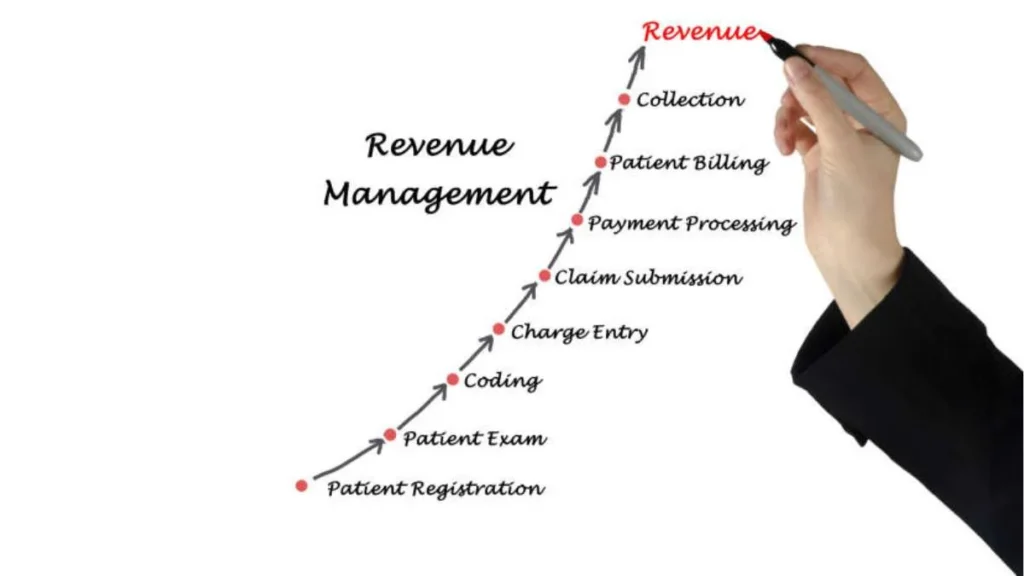HEALTH AND FITNESS
RCM Consultants: Revenue Cycle Management Solutions

When considering the role of RCM consultants in the healthcare sector, you’ll find they are indispensable for optimizing revenue cycle management solutions. They don’t just streamline processes; they also enhance patient engagement and ensure compliance with industry regulations. Utilizing technology like AI and predictive analytics, RCM consultants significantly improve financial performance and operational efficiency. But what exactly makes their approach so effective, and how do they tackle common RCM challenges? These questions are crucial as you look to maintain financial health in an ever-competitive industry.
Table of Contents
What Is Revenue Cycle Management?
Revenue Cycle Management (RCM) is a strategic process that healthcare organizations use to track patient care episodes from registration and appointment scheduling to the final payment of a balance. By leveraging financial analytics and sophisticated billing software, you can streamline this complex process to ensure that your organization maximizes revenue while minimizing administrative burdens.
When you implement effective RCM, you’re not just tracking finances; you’re strategically managing the entire patient journey. Financial analytics play a crucial role here, enabling you to identify trends, forecast revenue, and pinpoint areas needing improvement. With robust billing software, you automate tasks like claim submissions and follow-ups, drastically reducing the chances of human error and accelerating the reimbursement process.
In addition, financial analytics empower you to make data-driven decisions. They provide you with comprehensive insights into payment patterns, denial rates, and operational inefficiencies. The billing software complements this by offering features like real-time tracking and automated alerts, ensuring that nothing falls through the cracks.
Importance of RCM in Healthcare
In the ever-evolving landscape of healthcare, the importance of Revenue Cycle Management (RCM) can’t be overstated, as it directly impacts both the financial health of your organization and the quality of patient care.
A well-structured RCM system ensures that your practice maintains a steady cash flow while minimizing the risk of claim denials and delays. By streamlining administrative processes and optimizing billing procedures, RCM allows you to focus more on patient care rather than financial worries.
Patient engagement plays a crucial role in effective RCM. When patients understand their financial responsibilities upfront, they’re more likely to fulfill their obligations timely. This is where financial transparency becomes indispensable. Clear communication about costs, insurance coverage, and payment options not only enhances patient satisfaction but also reduces the likelihood of unpaid bills.
Implementing robust RCM practices can also provide valuable analytics, enabling you to identify trends and areas for improvement. By closely monitoring financial performance, you can make strategic decisions that enhance both operational efficiency and patient outcomes.
In an industry where margins are often thin, the strategic management of revenue cycles can be the difference between a thriving practice and one struggling to stay afloat.

Key Functions of RCM Consultants
RCM consultants play a pivotal role in optimizing your healthcare practice’s financial performance by offering expert guidance and actionable strategies tailored to your unique needs. One of their key functions is enhancing patient engagement. By implementing effective communication channels and providing clear billing information, they help reduce confusion and improve patient satisfaction. This approach not only boosts your revenue but also fosters long-term patient loyalty.
Another critical function of RCM consultants is staff training. They conduct comprehensive training sessions to ensure your team is well-versed in the latest billing codes, compliance requirements, and software systems. This targeted training minimizes errors and increases efficiency, leading to faster claim approvals and reduced denials.
RCM consultants also excel in analyzing and streamlining your existing processes. They meticulously review your revenue cycle, from patient registration to final payment, to identify bottlenecks and areas for improvement. By leveraging data analytics, they provide you with actionable insights that can significantly enhance your practice’s financial health.
Benefits of Partnering With RCM Consultants
Partnering with RCM consultants provides your healthcare practice with a strategic advantage, ensuring streamlined operations and maximized revenue. By leveraging their expertise, you’ll achieve financial optimization, which is critical in the increasingly complex healthcare landscape.
RCM consultants meticulously analyze your revenue cycle, identifying inefficiencies and implementing targeted solutions. This leads to enhanced financial performance, reducing claim denials and ensuring timely reimbursements.
Moreover, RCM consultants focus on workflow improvement, refining your operational processes. They assess every stage of your revenue cycle, from patient registration to final payment. By standardizing procedures and eliminating bottlenecks, they enhance efficiency and accuracy. This systematic approach not only boosts productivity but also improves patient satisfaction, as streamlined processes result in quicker, more transparent billing.
Additionally, partnering with RCM consultants allows you to concentrate on patient care rather than administrative burdens. Their expertise ensures compliance with ever-changing regulations, reducing the risk of costly penalties. With their strategic guidance, your practice can adapt to industry changes swiftly, maintaining a competitive edge.
Technology in RCM Solutions
Harnessing cutting-edge technology in revenue cycle management (RCM) solutions can further amplify the benefits of expert consultancy by automating processes and providing real-time data insights. When you integrate AI into your RCM systems, you streamline tasks such as patient registration, billing, and claims processing. This not only reduces human error but also significantly speeds up these processes, increasing efficiency and accuracy.
AI integration’s predictive analytics can identify potential issues before they become significant problems, allowing you to take proactive measures. For instance, AI algorithms can analyze trends in denied claims and suggest actionable steps to minimize these occurrences in the future. This level of insight is invaluable for maintaining a smooth revenue cycle.
Moreover, incorporating blockchain security into your RCM framework ensures that sensitive patient data and financial transactions are protected with the highest level of encryption. Blockchain’s decentralized nature makes it extremely difficult for unauthorized parties to alter or access data, providing an additional layer of security that traditional systems lack. This fortifies trust with your patients and stakeholders, ensuring compliance with stringent data protection regulations.
Common RCM Challenges
Often, healthcare providers face significant challenges in their revenue cycle management that can impede financial performance and operational efficiency. One of the most pervasive issues is claim denials. When claims are denied, it not only delays reimbursement but also necessitates additional resources to correct and resubmit claims. You must identify the root causes of these denials, which often stem from inaccurate patient information, coding errors, or failure to meet payer requirements.
Another common challenge is billing errors. These errors can range from simple data entry mistakes to more complex coding inaccuracies. Billing errors lead to delayed payments, increased claim denials, and ultimately, a negative impact on your bottom line. By implementing rigorous auditing processes and staff training programs, you can mitigate the incidence of these errors.
Additionally, the complexity of payer requirements and frequent changes in healthcare regulations add another layer of difficulty. Staying updated with these changes and ensuring compliance requires a strategic approach and constant vigilance.
To tackle these challenges effectively, you need a detailed and analytical approach that focuses on identifying inefficiencies and implementing corrective measures swiftly. Doing so can significantly enhance your operational efficiency and financial performance.
Choosing the Right RCM Consultant
Selecting the right RCM consultant requires a meticulous evaluation of their expertise, industry experience, and ability to deliver measurable results. To begin with, focus on their background and qualifications. Does the consultant have a proven track record in revenue cycle management? Check their certifications and any affiliations with recognized industry bodies.
Next, assess their industry experience. Have they worked with organizations similar to yours? Industry-specific knowledge can drastically impact the effectiveness of their solutions. Look for consultants who understand the unique challenges of your sector and have successfully navigated them before.
Evaluation criteria should also include their approach to problem-solving. Do they offer tailored strategies or one-size-fits-all solutions? You want a consultant who can customize their approach to meet your specific needs.
Additionally, scrutinize their ability to deliver measurable results. Ask for case studies or references that demonstrate their success in improving key performance indicators like claim denial rates, collection times, and overall revenue.

Case Studies and Success Stories
Understanding the importance of selecting the right RCM consultant, let’s explore real-world examples where expert guidance has led to substantial improvements in revenue cycle performance.
One healthcare provider, struggling with a 60-day average claim resolution time, partnered with a top-tier RCM consultant. Through a tailored strategy that included staff training and system optimization, they reduced this to 30 days. Client testimonials highlight not only the speed but also the seamless transition and increased staff satisfaction.
Another case involved a multi-specialty clinic facing mounting denials and low collection rates. By aligning their processes with industry benchmarks and implementing advanced analytics, the consultant helped decrease denial rates by 25% and boosted collections by 15%. The clinic’s CEO praised the RCM consultant’s analytical approach and strategic insights, emphasizing the significant financial turnaround.
Lastly, a rural hospital, previously operating at a loss, saw a 20% revenue increase after integrating a consultant’s comprehensive audit and process overhaul. Client testimonials from this hospital focus on the immediate impact and long-term sustainability of the changes made, aligning closely with industry benchmarks for rural healthcare facilities.
These examples underscore the transformative potential of skilled RCM consultants.
Conclusion
Partnering with RCM consultants is like having a lighthouse in a stormy sea. They’ll guide you through the tangled web of revenue cycle management, ensuring every step is optimized for peak performance.
With their strategic insights and cutting-edge technology, you’ll navigate challenges effortlessly, turning potential pitfalls into stepping stones.
Don’t let the complexities of RCM weigh you down; let expert consultants illuminate the path to financial health and operational excellence.
-

 GENERAL2 months ago
GENERAL2 months agoUncovering the World of кинокрадко: The Dark Side of Film Piracy
-

 GENERAL1 month ago
GENERAL1 month agoUnveiling the Art of преводсч: How Translators Bridge Language Barriers
-

 YOGA1 year ago
YOGA1 year ago4 Person Yoga Poses for Beginners
-

 GENERAL2 months ago
GENERAL2 months agoThe Journey of iamnobody89757: From Anonymous User to Internet Sensation


























